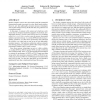Free Online Productivity Tools
i2Speak
i2Symbol
i2OCR
iTex2Img
iWeb2Print
iWeb2Shot
i2Type
iPdf2Split
iPdf2Merge
i2Bopomofo
i2Arabic
i2Style
i2Image
i2PDF
iLatex2Rtf
Sci2ools
154
click to vote
SOSP
2009
ACM
2009
ACM
Better I/O through byte-addressable, persistent memory
Modern computer systems have been built around the assumption that persistent storage is accessed via a slow, block-based interface. However, new byte-addressable, persistent memory technologies such as phase change memory (PCM) offer fast, fine-grained access to persistent storage. In this paper, we present a file system and a hardware architecture that are designed around the properties of persistent, byteaddressable memory. Our file system, BPFS, uses a new technique called short-circuit shadow paging to provide atomic, fine-grained updates to persistent storage. As a result, BPFS provides strong reliability guarantees and offers better performance than traditional file systems, even when both are run on top of byte-addressable, persistent memory. Our hardware architecture enforces atomicity and ordering guarantees required by BPFS while still providing the performance benefits of the L1 and L2 caches. Since these memory technologies are not yet widely available, we evaluate ...
Operating System | Persistent Memory Technologies | Persistent Storage | Phase Change Memory | SOSP 2009 |
| Added | 17 Mar 2010 |
| Updated | 17 Mar 2010 |
| Type | Conference |
| Year | 2009 |
| Where | SOSP |
| Authors | Jeremy Condit, Edmund B. Nightingale, Christopher Frost, Engin Ipek, Benjamin C. Lee, Doug Burger, Derrick Coetzee |
Comments (0)

